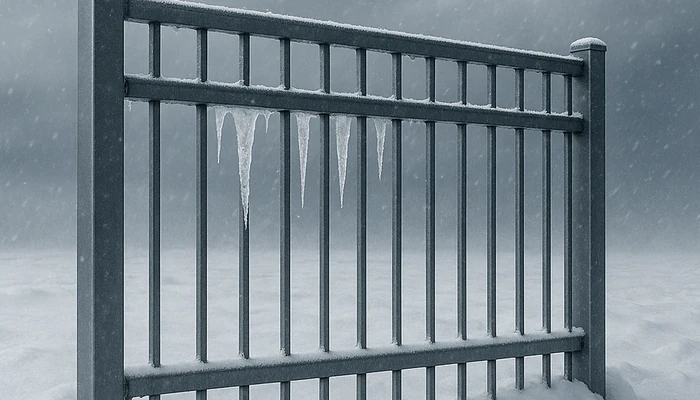Understanding the Durability of Steel Fences in Extreme Climates
For homeowners, property managers, and general contractors in Chicago and its suburbs, choosing a fence that stands up to the city’s weather is essential. Steel fences are a common sight, but how well do they perform when faced with freezing winters, heavy snow, and fluctuating temperatures? This post explores the key factors affecting the durability of steel fences in extreme climates, with a focus on practical tips for winter care, pet safety, and design choices that enhance performance.
What Makes Steel Fences Suitable for Harsh Weather?
Steel fences are valued for their strength, longevity, and security. In regions like Chicago, where winters bring heavy snowfall and below-freezing temperatures, these attributes are even more important. Modern steel fences are typically galvanized, meaning they’re coated with zinc to resist corrosion (galvanization process details). This process gives steel fences a significant advantage over other materials in terms of weather resistance and lifespan.
Key Factors Affecting Steel Fence Durability
- Galvanization: Adds a rust-resistant layer, especially crucial in wet or icy climates.
- Powder Coating: Provides extra protection and color options for property design needs.
- Installation Quality: Proper installation ensures posts are below the frost line to prevent heaving during freeze-thaw cycles.
- Winter Maintenance: Removes snow and prevents ice accumulation, reducing surface damage.
Comparison Table: Steel Fence vs. Other Fence Types in Extreme Climates
| Fence Material | Weather Resistance | Maintenance Needs | Lifespan (Years) |
|---|---|---|---|
| Steel | Excellent (with galvanization) | Low to Moderate | 20–50+ |
| Wood | Moderate | Moderate to High | 10–20 |
| Vinyl | Good | Low | 20–30 |
| Chain Link | Good (with coating) | Low | 15–30 |
For more information on different steel fence types, see our detailed comparison guide.
Winter Care Tips for Steel Fencing in Chicago
Extreme cold, ice, and snow can put additional stress on steel fences. Here are some practical maintenance steps to maximize durability:
- Clear snow and ice buildup promptly, especially around gates and bottom rails.
- Inspect for chips or scratches in protective coatings and touch up as needed.
- Lubricate hinges and locks before winter to prevent them from freezing.
- Check post stability after freeze–thaw cycles; posts should not shift or tilt.
See how to prevent corrosion on steel fences for more in-depth maintenance advice.
Pet Safety and Long-Term Fence Performance
Steel fences are an effective solution for keeping pets safe, even in challenging conditions. Their sturdy construction resists impacts from snow shoveling, drifting, or pets jumping against them. To improve pet safety:
- Choose panel styles with smaller gaps for small animals.
- Ensure all fasteners are secure and rust-free.
- Inspect fence bottoms to prevent digging after the ground thaws.
Design Ideas to Enhance Fence Durability and Appeal
Design choices can boost both the look and function of your steel fence. Consider:
- Ornamental Finials: Basic design elements that won’t collect snow or ice.
- Double Top Rails: Reinforce against wind and snow loads.
- Hot-Dip Galvanized Panels: Extend lifespan even in corrosive environments (hot-dip galvanizing explained).
- Custom Heights: Match your property’s snow drift patterns and visibility needs. Review design considerations for steel fencing.
Explore more on design options for steel fences.
Cost Considerations
While steel fences may require a higher initial investment than some other materials, their long-term durability and lower maintenance make them a cost-effective option for Chicago-area properties. Proper installation, maintenance, and smart design choices can help property owners maximize their return on investment.
Why Regular Inspection Matters
Routine fence inspections are the best way to catch minor problems before they become costly repair issues. Freeze–thaw cycles, debris, and road salt can all lead to corrosion if left unaddressed. Learn more about the importance of regular steel fence inspection.
Conclusion: Is a Steel Fence Right for Your Property?
Steel fences’ inherent strength and weather resistance make them an excellent option for properties in Chicago’s unpredictable climate. With proper winter care and smart design, they deliver reliable performance for decades. If you’re considering a steel fence for your Chicago property or want to explore alternatives like a vinyl fence of Chicago, contact a local expert for an on-site assessment.
About the Author
Reviewed by: Chicago Commercial Fencing Team
With over 20 years of experience installing steel, iron, and specialty fences across Chicago and its suburbs, our experts are dedicated to practical, code-compliant solutions that last. We focus on quality materials, professional installation, and safety for every client.

Fence Contractor Chicago IL, Steel Fence Chicago IL, Chicago Steel Fence, steel fencing in Chicago, steel best fencing near Schaumburg il, steel fences in Franklin Park, steel best fences in the city of Addison IL, steel best fence near Elgin, steel fence Evanston il, steel fence permit Melrose Park
